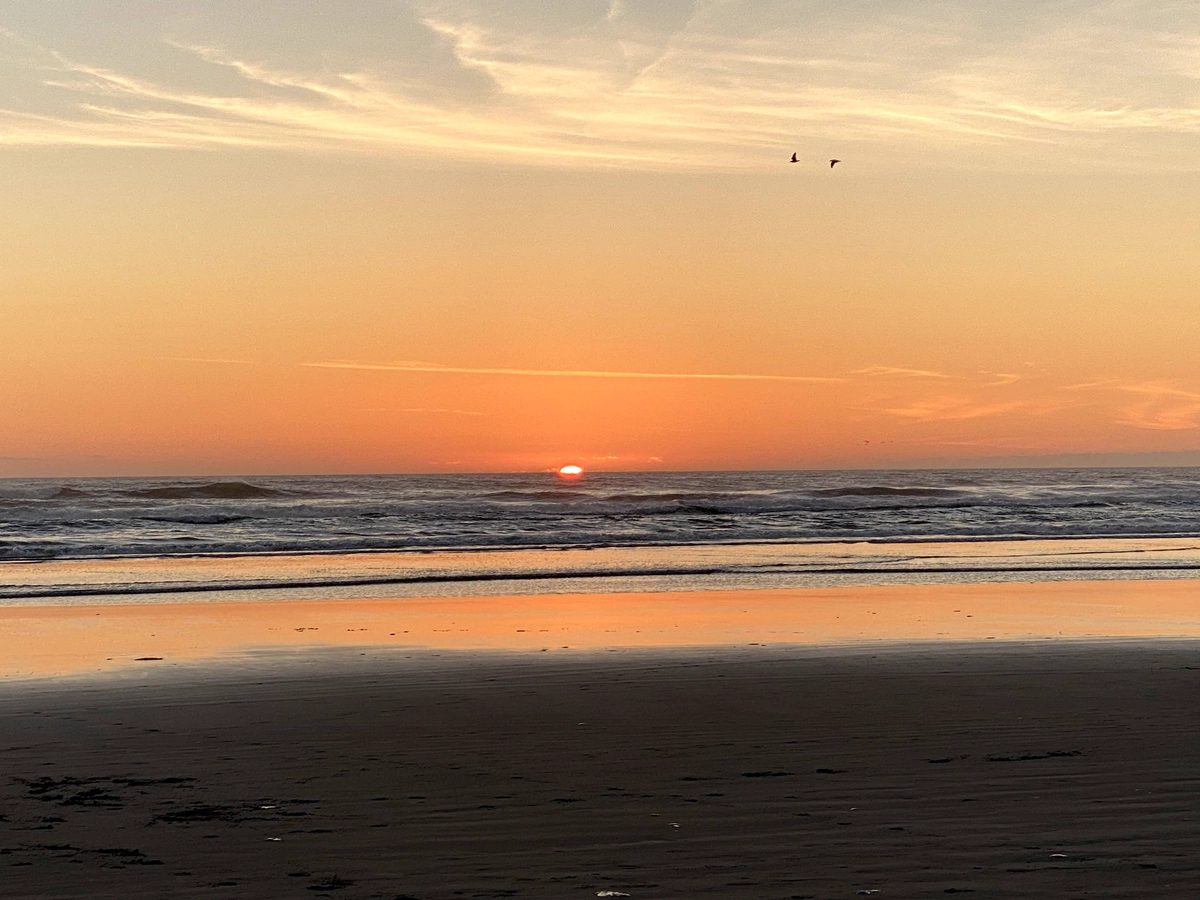August was a fun month for me. I’ve picked up a new habit of taking pen-and-paper notes while reading non-fiction, and it’s been pretty engaging. So far, I’ve noticed that I retain content a lot better when I take notes, though it does take substantially longer to get through books this way. I don’t plan to take notes on all the non-fiction I read, but for topics that strongly interest me, I’m planning to continue with this. (Pen/paper notes were super helpful in writing my recent B-Tree post)
This is almost too boring to mention, but this month I found a new favorite note-taking pen: the Pentel EnerGel Needle Tip (0.3mm). I really like the fine-tipped Sigma Micron pens, but I strongly prefer a retractable pen to one with a cap. The Pentel EnerGel fits those requirements nicely. They’re super cheap, and have held up to lots of use.
I also took a week off work to go to the Oregon coast, which was super refreshing. I was overdue for a break. 😅
On the COVID front, our WFH/RTO got bumped out to January 2022. Hardly surprising, given the delta variant. At this point, I gotta just throw up my arms and say I have no idea whenever things are going to be normal-ish again. I wouldn’t bet on January. 🤷♂️
What I’ve Been Reading
-
Database Internals (5/5 ⭐️): Probably my favorite technical book since Designing Data-Intensive Applications (DDIA). The first half is on database storage engines, and the second half is on distributed systems – with strong emphasis on distributed database systems. Like DDIA, Database Internals has a high-breadth, modest-depth approach. You won’t go away from this book knowing exactly how to implement, say, a Log-Structured Merge-Tree, but you’ll know the concepts and be comfortable with enough of the buzzwords that you can search for the rest fairly easily. I love this type of book, since it opens up tons of areas of new things to research, without getting bogged down in detail. I felt that the first half of this book (on storage engines) was stronger than the second (on distributed systems). For distributed systems, I’d more highly recommend DDIA. However, both books complement each other nicely, and I suspect I’ll be recommending Database Internals for years to come.
-
The City & the City (4/5 ⭐️): A police procedural mystery set in an alternate-history world wherein two cities exist in the same geographic location, but residents of either city must not acknowledge the other city’s presence, under threat of secret police. The world building is excellent, though I found the mystery plot itself to be “just OK”.
-
An Economist Gets Lunch (3/5 ⭐️): An interesting book on how to be a foodie from an economist’s perspective. Contains an interesting history of the decline of the US fine-dining scene in the 20th century (primarily due to prohibition) and its later revitalization (primarily due to immigration). An Economist Gets Lunch also has a fairly interesting set of “turns out” refutations to common foodie topics; for example, eating local might be worse for the environment (the claim is that industrialized food production gets ecological returns from scale, and most of the carbon footprint of food is not from its transport). However, there are entire chapters of this book that feel predicated on personal preference, as opposed to anything based in “hard economics”, so I’d struggle to recommend this book.
-
The Book of Koli (4/5 ⭐️): Another great science fiction novel by M.R. Carey. I’ve previously enjoyed his The Girl with All the Gifts series. Within 20 pages of this book, I was hooked. It’s set in a post-apocalyptic Britain, where (likely due to runaway genetic modification) all non-human life – from trees to forrest animals – has become intensely hostile and aggressive. Excellent storytelling, in-world linguistic tricks, and Carey’s writing style makes this a page turner. The Book of Koli is the first book in a trilogy, and immediately after finishing the first, I’ve started on the second.
Assorted Links
- Einstein on the Beach
- This month I became fascinated with Einstein on the Beach. It’s a sort
of avant garde opera that is almost impossible to describe. It’s
very long and has a lot of repetition, but it somehow remains totally
enrapturing. It has this surreal “WTF Is Going On” quality that has kept
it lodged in my brain. To get a sense for this, I appreciated
this LA Times synopsis:
“Einstein” has no narrative. “Einstein” has no Einstein, even though a great many onstage are dressed in the iconic image of frizzy-haired scientist. “Einstein on the Beach” has no beach. Glass’ relentlessly fast and loud score is four hard-driving hours of Minimalism. Spoken text comes from the sputtering of mid-1970s New York AM radio, cut up. Sung text consists of a chorus counting rhythms or the solfège syllables of pitches.
- Performance Recordings:
- This month I became fascinated with Einstein on the Beach. It’s a sort
of avant garde opera that is almost impossible to describe. It’s
very long and has a lot of repetition, but it somehow remains totally
enrapturing. It has this surreal “WTF Is Going On” quality that has kept
it lodged in my brain. To get a sense for this, I appreciated
this LA Times synopsis:
- MyIRMobile – A government website for looking up your immunization history. The obvious use is to verify (or provide proof of) your COVID vaccination, but it also contains records of previous vaccines. I was trying to dig up my immunization history recently while switching doctors, and this was pretty useful. Unfortunately, it’s currently only available in 8 US states.
